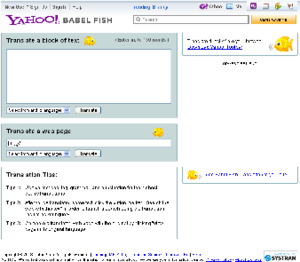
Machine translation is use of either rule-based or probabilistic machine learning approaches to translation of text or speech from one language to another, including the contextual, idiomatic and pragmatic nuances of both languages.
Meta elements are tags used in HTML and XHTML documents to provide structured metadata about a Web page. They are part of a web page's head section. Multiple Meta elements with different attributes can be used on the same page. Meta elements can be used to specify page description, keywords and any other metadata not provided through the other head elements and attributes.

SYSTRAN, founded by Dr. Peter Toma in 1968, is one of the oldest machine translation companies. SYSTRAN has done extensive work for the United States Department of Defense and the European Commission.

robots.txt is the filename used for implementing the Robots Exclusion Protocol, a standard used by websites to indicate to visiting web crawlers and other web robots which portions of the website they are allowed to visit.
Search engine optimization (SEO) is the process of improving the quality and quantity of website traffic to a website or a web page from search engines. SEO targets unpaid traffic rather than direct traffic or paid traffic. Unpaid traffic may originate from different kinds of searches, including image search, video search, academic search, news search, and industry-specific vertical search engines.

AltaVista was a Web search engine established in 1995. It became one of the most-used early search engines, but lost ground to Google and was purchased by Yahoo! in 2003, which retained the brand, but based all AltaVista searches on its own search engine. On July 8, 2013, the service was shut down by Yahoo!, and since then the domain has redirected to Yahoo!'s own search site.
Remote Desktop Protocol (RDP) is a proprietary protocol developed by Microsoft Corporation which provides a user with a graphical interface to connect to another computer over a network connection. The user employs RDP client software for this purpose, while the other computer must run RDP server software.
Yahoo! Native is a native "Pay per click" Internet advertising service provided by Yahoo.
Pay-per-click (PPC) is an internet advertising model used to drive traffic to websites, in which an advertiser pays a publisher when the ad is clicked.
Yahoo! Search is a search engine owned and operated by Yahoo!, using Microsoft Bing to power results.

Windows Internet Explorer 7 (IE7) is a web browser for Windows. It was released by Microsoft on October 18, 2006, as the seventh version of Internet Explorer and the successor to Internet Explorer 6. Internet Explorer 7 is part of a long line of versions of Internet Explorer and was the first major update to the browser since 2001. It was the default browser in Windows Vista and Windows Server 2008, as well as Windows Embedded POSReady 2009, and can replace Internet Explorer 6 on Windows XP and Windows Server 2003, but unlike version 6, this version does not support Windows 2000, Windows ME, or earlier versions of Windows. It also does not support Windows 7, Windows Server 2008 R2 or later Windows Versions.

Bing Maps is a web mapping service provided as a part of Microsoft's Bing suite of search engines and powered by the Bing Maps Platform framework which also support Bing Maps for Enterprise APIs and Azure Maps APIs. Since 2020, the map data is provided by TomTom, OpenStreetMap and others.

Microsoft Bing, commonly referred to as Bing, is a search engine owned and operated by Microsoft. The service traces its roots back to Microsoft's earlier search engines, including MSN Search, Windows Live Search, and Live Search. Bing offers a broad spectrum of search services, encompassing web, video, image, and map search products, all developed using ASP.NET.
Machine translation is a sub-field of computational linguistics that investigates the use of software to translate text or speech from one natural language to another.

Carlos De Antonis is an Argentine opera singer.

Microsoft Translator is a multilingual machine translation cloud service provided by Microsoft. Microsoft Translator is a part of Microsoft Cognitive Services and integrated across multiple consumer, developer, and enterprise products, including Bing, Microsoft Office, SharePoint, Microsoft Edge, Microsoft Lync, Yammer, Skype Translator, Visual Studio, and Microsoft Translator apps for Windows, Windows Phone, iPhone and Apple Watch, and Android phone and Android Wear.

A Microsoft account or MSA is a single sign-on personal user account for Microsoft customers to log in to consumer Microsoft services, devices running on one of Microsoft's current operating systems, and Microsoft application software.
Scroogled was a Microsoft attack advertising campaign that ran between November 2012 and 2014. Created by Mark Penn, the campaign sought primarily to attack a competing company, Google, by pointing out disadvantages and criticism of their products and services in comparison to those run by Microsoft. The original campaign focused on Google Shopping's change to a pay-per-click model, with later campaigns focusing upon Google's use of user data for targeted advertising, and the capabilities of the ChromeOS platform in comparison to Windows.










